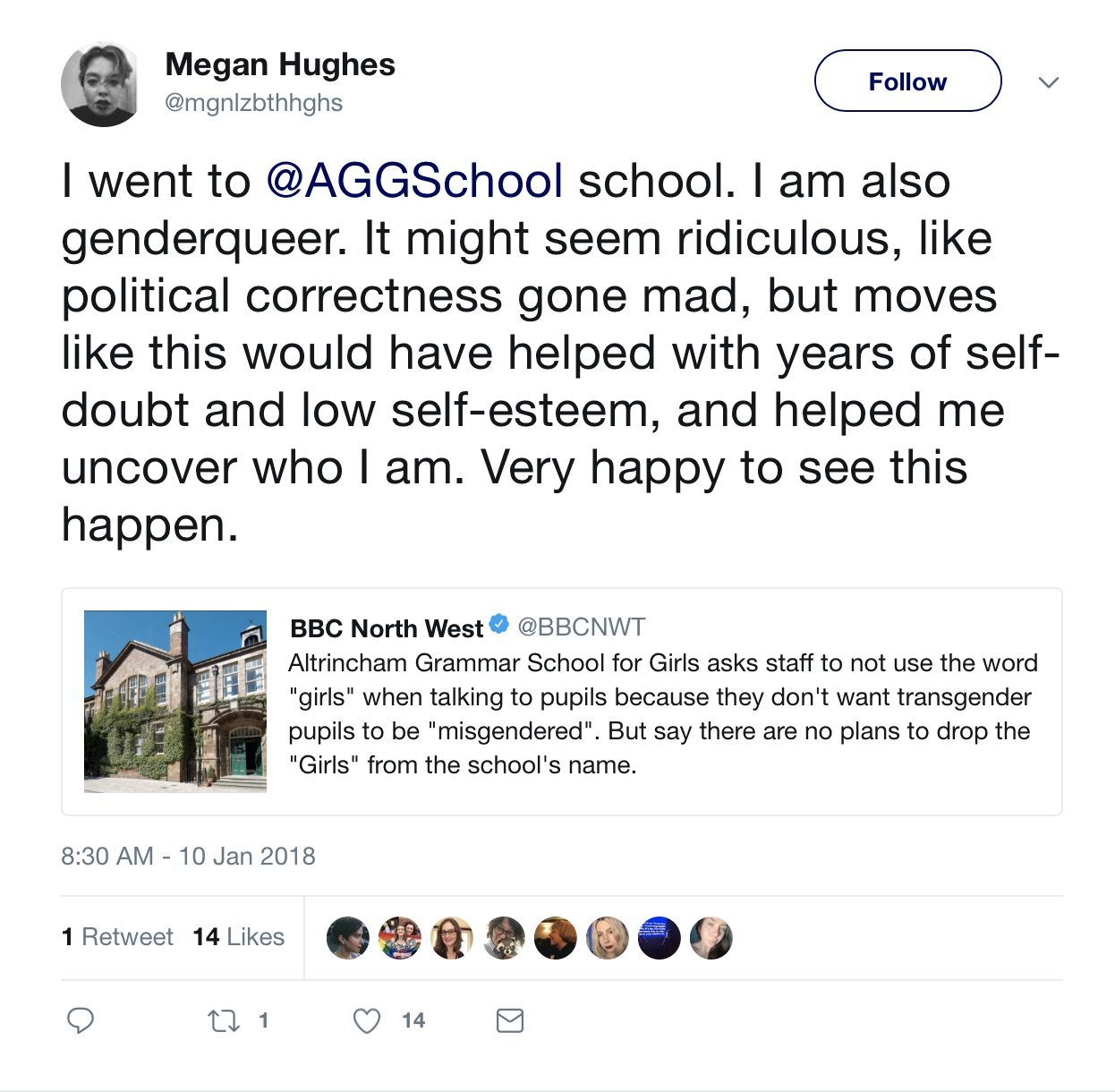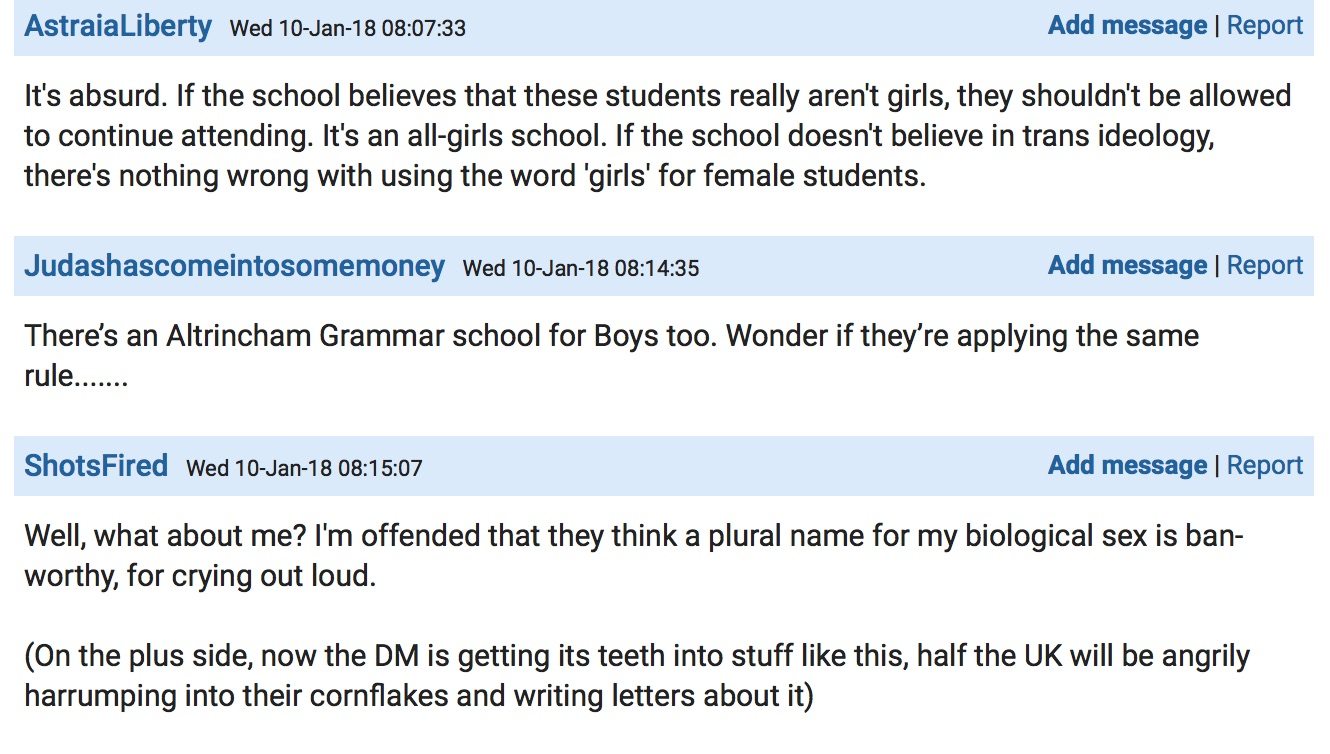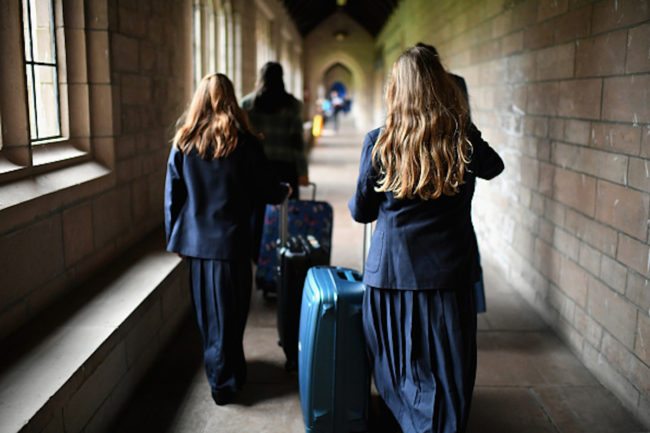Top British girls grammar school bans teachers from calling pupils ‘girls’ to avoid offending transgender children

GLENALMOND, SCOTLAND – SEPTEMBER 05: School girls arrive at Glenalmond College for the first day of term on September 5, 2017 in Glenalmond, Scotland. For the first time in one hundred and seventy years, girls will be boarding in the Gothic Front Quad of Glenalmond which has been until now a purely male preserve. Girls have boarded at the school since 1991 but until today accommodated in purpose-built boarding houses away from the historic Quad. The independent boarding school founded by William Gladstone and James Hope Scott is based on the architecture of Oxford University. (Photo by Jeff J Mitchell/Getty Images)
Altrincham Grammar School for Girls, one of the top grammar schools in Britain, has announced that it has banned teachers from using the term of address ‘girls’ to avoid offending transgender children.
The Cheshire based Grammar School for girls is the biggest single-sex grammar school in England with around 1,250 students aged 11-18. It is currently one of the highest achieving schools in England with a 100% pass rate at GCSE level.
The school has issued the ban of the word ‘girls’ as a form of address to prevent any non-binary or transgender children becoming offended.
In a school statement regarding the language change, the school said: “It is important that our students feel comfortable and able to bring their true self to their learning environment. We welcome and celebrate diversity at our school and will look at any measure, however small, that helps to ensure the wellbeing of our staff and students.”
Ex-pupil of the school Megan Hughes tweeted the Grammar school to congratulate them on this move to inclusion. She said; “I went to @AGGschool school. I am also genderqueer. It might seem ridiculous, like political correctness gone mad, but moves like this would have helped with years of self-doubt and low self-esteem, and helped me uncover who I am. Very happy to see this happen”.

Ex-sudent, Megan Hughes, now a student at Oxford University, tweeted the school to congratulate them on thier new policy (photo from @mgnlzbthhgbs)
All parents were issued with a letter prior to the change to non-gendered language which explained why they were altering their speech.
The letter stated: “We are conscious of recent figures which show that more than four in five trans young people have self-harmed and more than two in five have attempted to take their own life”.
Despite these shocking statistics and the school’s obvious attempts to try and make their students as comfortable as possible in their learning environment some parents did not welcome the positive change with open arms.
Via parenting forum Mumsnet, parents have been expressing their reservations regarding simple language change with outright transphobia.
One parent wrote: “It’s absurd. If the school believes that these students really aren’t girls, they shouldn’t be allowed to continue attending. It’s an all-girls school. If the school doesn’t believe in trans ideology, there’s nothing wrong with using the word ‘girls’ for female students”.

Mumsnet is a popular Internet forum where parents can discuss being a parent- they have been very active in their use of it to discuss the change in The Altrincham Grammar School for Girls language change (photo from mums net.com)
A separate mother of a student at the school wrote that the school had made the change not because of inclusion and inequality, but out of fear.
She wrote: “I think one of the reasons for this change could well be classroom and time management under the guise of inclusion and equality. I don’t know how many transgender students are at the school (not many) but I am aware of the disruption that can be caused when one of these students becomes upset…
“It is a results driven school and so I would think that any changes that can eliminate this disruption will be a winning solution; the school looks caring and forward-thinking while teachers have one less issue to navigate in their mission to deliver excellent exam results”.

It is not known how many transgender children there are at The Altrincham Grammar School for Girls, however the schools aim is to make them feel comfortable (Photo by Jeff J Mitchell/Getty Images)
Regardless of whether the reasoning behind the change in language is results driven, or if the school genuinely cares for the student’s well-being, the move to gender-neutral speech is a positive one and should be celebrated.

